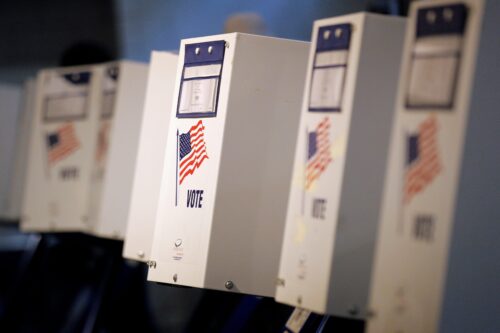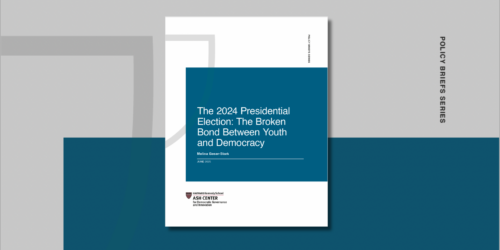
Feature
Reimagining Democracy Summer Reading List
A collection of must-reads curated by Ash Center’s Reimagining Democracy team.
Media Release
Washington DC — In a new report released today, a diverse group of 25 experts in U.S. politics, elections, and civil rights make the case for universal civic duty voting—that is, mandatory participation in elections—in the United States. “Lift Every Voice: The Urgency of Universal Civic Duty Voting,” is the culmination of an 18-month effort to examine the need for—and path toward—universal civic duty voting.
“We see voting as a civic responsibility no less important than jury duty,” write the report’s authors, a group of 25 leading scholars, practitioners, and advocates who have dedicated their careers to strengthening access to voting and democratic governance in the United States. The working group, convened jointly by the Brookings Institution and the Ash Center was co-chaired by E.J. Dionne, Jr., the W. Averell Harriman Chair and Senior Fellow at Brookings Governance Studies and Miles Rapoport, the Senior Practice Fellow in American Democracy at the Ash Center. A complete list of members is included below.
Underscoring that voting is both a right and a duty, the working group recommends adopting universal civic duty voting for most federal, state, and municipal elections. Requiring citizens to participate, the report authors argue, would survive legal challenges and is “consistent with our Constitution’s guarantees of free speech, robust forms of collective action, and effective government.” The proposal for universal civic duty voting would require mandatory participation in elections, not mandatory voting, allowing voters to choose ‘none of the above,’ or decline to participate for conscientious objections.
The report authors make the case that universal civic duty voting would help ensure increased political participation in communities of color that have long confronted exclusion from our democracy. Coupled with legal and political reforms, universal civic duty voting would drastically undercut voter suppression measures, and strongly encourage election officials and other institutions to work for unimpeded access to the ballot box. Universal voting, the authors write, “would clarify the priorities of election officials at every point in the process: Their primary task would be to allow citizens to embrace their duties, not to block their participation.”
Working group member Janai Nelson, Associate Director-Counsel of the NAACP Legal Defense and Educational Fund explains: “Our constitution guarantees the right to free speech and protects against racial discrimination in voting. Nonetheless, virulent voter suppression — like stringent voter ID laws, voter purges, targeted polling site closures, attacks on early voting and onerous and unsafe absentee ballot requirements — are silencing the voices of far too many Black voters and other voters of color. Universal voting has the potential to directly and efficiently eliminate the voter suppression tactics that prevent our increasingly diverse electorate from being heard. Universal voting would also improve representation, encourage greater accountability to all constituents, and advance the integrity of our democracy. As we rethink structural racism in this critical moment in history, we have an opportunity for true societal transformation by taking the proposal of universal voting seriously and implementing it in service of disenfranchised communities.”
The implementation of civic duty voting, and the legislation to enact the policy at each level of government, would vary based on jurisdiction, but the working group outlines core elements required to make universal voting a success. These include expanded funding for election administration, protections and provisions for communities of color and those with disabilities, as well as robust public education and civic education in schools.
The report, which concludes with a checklist of policy recommendations for federal, state, and local government, businesses, and community organizations, emphasizes that action from multiple civic actors will be needed to enact change.
“Lift Every Voice: The Urgency of Universal Civic Duty Voting” is available on the Brookings website at https://www.brookings.edu/research/lift-every-voice-the-urgency-of-universal-civic-duty-voting.
At 1:00pm EST on July 20, Brookings and the Ash Center will co-host an online discussion about the report and panelists will answer viewer questions. Tune in to watch it live at https://www.brookings.edu/events/lift-every-voice-the-urgency-of-universal-civic-duty-voting/. Archival video will be available after its conclusion.
###
The Universal Voting Working Group to study and advance the idea of universal civic duty voting in the United States was launched by the Brookings Institution and the Ash Center for Democratic Governance and Innovation at Harvard Kennedy School in Fall 2018. Organized by Miles Rapoport, Ash Center Senior Practice Fellow in American Democracy, and E.J. Dionne Jr., Brookings Senior Fellow and Harvard Visiting Professor. The working group includes 25 members:
Michelle Bishop, National Disability Rights Network; Cornell William Brooks, Harvard Kennedy School; Nick Chedli Carter, Resilient Democracy Fund; Allegra Chapman, Chapman Consulting and Common Cause; Cheryl Clyburn Crawford, Mass VOTE; Joshua A. Douglas, University of Kentucky Rosenberg College of Law; Anthony Fowler, The University of Chicago; Archon Fung, The Ash Center for Democratic Governance and Innovation, Harvard Kennedy School; William A. Galston, The Brookings Institution; Amber Herrle, The Brookings Institution; Cecily Hines, The Ash Center for Democratic Governance and Innovation, Harvard Kennedy School; MarÃa Teresa Kumar, Voto Latino; Carolyn J. Lukensmeyer, National Institute for Civil Discourse; Thomas E. Mann, The Brookings Institution; Terry Ao Minnis, Asian Americans Advancing Justice | AAJC; Janai Nelson, NAACP Legal Defense and Educational Fund; Nick Nyhart, Nyhart Consulting; Norman J. Ornstein, American Enterprise Institute; Andre M. Perry, The Brookings Institution; Whitney Quesenbery, Center for Civic Design; Ian Simmons, Blue Haven Initiative; Shane P. Singh, University of Georgia; Tova Wang, The Ash Center for Democratic Governance and Innovation, Harvard Kennedy School; Dorian Warren, Community Change; Brenda Wright, Demos
The Governance Studies program at Brookings is dedicated to analyzing policy issues, political institutions and processes, and contemporary governance challenges. Our scholarship identifies areas in need of reform and proposes specific solutions with the goals of: improving the performance of the national government; informing debate; and providing policymakers with expert analysis and ideas to ensure better institutional governance.
The Ash Center for Democratic Governance and Innovation at Harvard Kennedy School advances excellence in governance and strengthens democratic institutions worldwide. Through its research, education, international programs, and government innovations awards, the Center fosters creative and effective government problem solving and serves as a catalyst for addressing many of the most pressing needs of the world’s citizens.
Contact Information
Daniel Harsha
Ash Center for Democratic Governance and Innovation
Daniel_Harsha@hks.harvard.edu
Sarah Grucza
Ash Center for Democratic Governance and Innovation
Sarah_Grucza@hks.harvard.edu
Jessica Harris
The Brookings Institution
jbharris@brookings.edu
Feature
A collection of must-reads curated by Ash Center’s Reimagining Democracy team.
Feature
The official start of Summer is almost here, and Stephen Richer, Senior Practice Fellow in American Democracy and former elected Maricopa County Recorder, shares his summer reading list with a range of books focused on his work of democracy and elections, as well as his personal favorites.
Policy Brief
The 2024 election saw Donald Trump make significant gains among young voters, increasing his support among 18- to 29-year-olds by 10 percentage points. This report aims to investigate the deeper issues at stake that are causing this historical shift.
Feature
A collection of must-reads curated by Ash Center’s Reimagining Democracy team.
Feature
The official start of Summer is almost here, and Stephen Richer, Senior Practice Fellow in American Democracy and former elected Maricopa County Recorder, shares his summer reading list with a range of books focused on his work of democracy and elections, as well as his personal favorites.
Policy Brief
The 2024 election saw Donald Trump make significant gains among young voters, increasing his support among 18- to 29-year-olds by 10 percentage points. This report aims to investigate the deeper issues at stake that are causing this historical shift.


